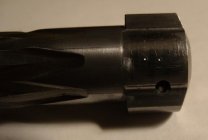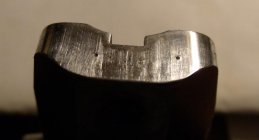I don't know anything about Mil-Comm TW25B. I don't know if the MIL Spec means it contains EP additives. It may just be a quality general purpose gun lube? For bolt lug protection you need a grease that is called Extreme Pressure (EP) usage. Grease called extreme usage doesn't mean it contains EP chemicals. Extreme usage may be sales lingo?
The pressure when the gun is fired cannot produce galling. There has to be high contact pressure when the bolt is rotated and the lug and receiver slide against each other. Is the bolt below some hardness spec.? Talk to the BAT people about your problem. Ask BAT to verify it's properly made. Who knows they may replace it if your lucky. If the lugs are galled the receiver must be galled also. Your rifle may work without problems if you have not lost head space?
The only grease I could find at Auto Zone rated EP was Mobil 1 Synthetic Grease. I put a small amount of this grease on my bolts lugs and bolt cocking ramp every time I go to the range. The rotary sliding motion of the lug contact probably wipes the grease off quickly. EP chemicals give extra protection when there are high contact loads, differential gears, wheel bearings ect.
Mobil Delvacâ„¢ Xtreme Grease
Mobil Delvac Xtreme Grease is an extra high performance extreme-pressure grease. It is an NLGI 2 grade and is manufactured with a proprietary, high-temperature lithium complex thickener system.
It exhibits excellent resistance to softening under severe working and provides good adhesion and cohesion. An extreme-pressure additive provides exceptional protection against wear and shock loads, while additional additives enhance resistance to high-temperature oxidation and protection against rust. Other formulation features provide very good resistance to water wash, and long service in bearings operating at high temperatures. This heavy-duty, severe-service grease has outstanding structural stability and chemical stability, will not corrode steel or copper bearing alloys, and is compatible with conventional seal materials.
Gunsmiths and store salesmen are not experts on lubricants. A gunsmith may know from experience what seems to work. I wouldn't use anything that wasn't rated "Extreme Pressure (EP)".
http://www.mobil.com/USA-English/Lubes/PDS/GLXXENGRSMOMobil_1_Synthetic_Grease.aspx
Mobil 1 Synthetic Grease
High performance automotive grease
Product Description
Mobil 1 Synthetic Grease is an NLGI No 2 high-performance automotive grease which combines a synthetic base fluid with a lithium complex soap thickener. The thickener system provides a high dropping point, while additives impart optimum extreme-pressure properties and excellent resistance to water wash, and outstanding protection against rust and corrosion. Mobil 1 Synthetic Grease has excellent structural stability. The synthetic base oil used in Mobil 1 Synthetic Grease gives it excellent performance properties at both high and low temperatures. High structural shear stability coupled with a high performance base oil make Mobil 1 Synthetic an outstanding automotive grease.
Features and Benefits
Mobil 1 Synthetic Grease provides the following advantages and benefits:
Features Advantages and Potential Benefits
All-purpose automotive service Certified to the NLGI GC-LB specifications for both chassis and wheel bearing lubrication
Wide Operating range -40 C (- 40 F) to 150 C (302 F)
Excellent resistance to rust and corrosion Longer life of bearings and chassis lube points
Outstanding structural stability Ability to provide effective lubrication over extended periods of time
Excellent wear protection under heavy loads Provides bearing protection while cornering and other conditions where bearings temporarily experience heavy loads.
Excellent resistance to water wash Withstands the effects of water washout from heavy rain storms or other high water wash events.
Applications
Mobil 1 Synthetic Grease meets the requirements of the National Lubricating Grease institute (NLGI) performance classification GC-LB. It is recommended for automotive applications at both high and low temperatures. It is particularly suited for applications such as disc brake wheel bearings and ball and steering joints. It will provide outstanding bearing protection under heavy loads at any highway speed, and where moisture or condensation is a factor.
http://www.mobil.com/USA-English-
Mobil Delvacâ„¢ Xtreme Grease
LCW/heavydutyengineoils_products_mobil-delvac-xtreme-grease.aspx
It is recommended for use in heavy-duty trucks, especially hinge and bucket pins, U-joints, and fifth wheels. It is also recommended for construction and mining sector applications, particularly for the lubrication of plain and antifriction bearings in contractor and mining vehicles working under severe operating and weather conditions. Mobil Delvac Xtreme Grease is also recommended for use in heavily loaded industrial bearings. The recommended application temperature range is -20°C to +175°C.
I didn't read your letter to BAT before I wrote this. It's painful to review 46 replies before I write something. Bat's reply sounds good. A tight case when closing the bolt. The load on the lugs has to come from some where when the bolt is moving. It's unfortunate they don't use harder metal to make these parts. I forgot to add that some EP chemicals form a layer that bonds to the metal. It doesn't wipe off.
Check this out
https://www.youtube.com/watch?v=VYTT8igfFeg
The pressure when the gun is fired cannot produce galling. There has to be high contact pressure when the bolt is rotated and the lug and receiver slide against each other. Is the bolt below some hardness spec.? Talk to the BAT people about your problem. Ask BAT to verify it's properly made. Who knows they may replace it if your lucky. If the lugs are galled the receiver must be galled also. Your rifle may work without problems if you have not lost head space?
The only grease I could find at Auto Zone rated EP was Mobil 1 Synthetic Grease. I put a small amount of this grease on my bolts lugs and bolt cocking ramp every time I go to the range. The rotary sliding motion of the lug contact probably wipes the grease off quickly. EP chemicals give extra protection when there are high contact loads, differential gears, wheel bearings ect.
Mobil Delvacâ„¢ Xtreme Grease
Mobil Delvac Xtreme Grease is an extra high performance extreme-pressure grease. It is an NLGI 2 grade and is manufactured with a proprietary, high-temperature lithium complex thickener system.
It exhibits excellent resistance to softening under severe working and provides good adhesion and cohesion. An extreme-pressure additive provides exceptional protection against wear and shock loads, while additional additives enhance resistance to high-temperature oxidation and protection against rust. Other formulation features provide very good resistance to water wash, and long service in bearings operating at high temperatures. This heavy-duty, severe-service grease has outstanding structural stability and chemical stability, will not corrode steel or copper bearing alloys, and is compatible with conventional seal materials.
Gunsmiths and store salesmen are not experts on lubricants. A gunsmith may know from experience what seems to work. I wouldn't use anything that wasn't rated "Extreme Pressure (EP)".
http://www.mobil.com/USA-English/Lubes/PDS/GLXXENGRSMOMobil_1_Synthetic_Grease.aspx
Mobil 1 Synthetic Grease
High performance automotive grease
Product Description
Mobil 1 Synthetic Grease is an NLGI No 2 high-performance automotive grease which combines a synthetic base fluid with a lithium complex soap thickener. The thickener system provides a high dropping point, while additives impart optimum extreme-pressure properties and excellent resistance to water wash, and outstanding protection against rust and corrosion. Mobil 1 Synthetic Grease has excellent structural stability. The synthetic base oil used in Mobil 1 Synthetic Grease gives it excellent performance properties at both high and low temperatures. High structural shear stability coupled with a high performance base oil make Mobil 1 Synthetic an outstanding automotive grease.
Features and Benefits
Mobil 1 Synthetic Grease provides the following advantages and benefits:
Features Advantages and Potential Benefits
All-purpose automotive service Certified to the NLGI GC-LB specifications for both chassis and wheel bearing lubrication
Wide Operating range -40 C (- 40 F) to 150 C (302 F)
Excellent resistance to rust and corrosion Longer life of bearings and chassis lube points
Outstanding structural stability Ability to provide effective lubrication over extended periods of time
Excellent wear protection under heavy loads Provides bearing protection while cornering and other conditions where bearings temporarily experience heavy loads.
Excellent resistance to water wash Withstands the effects of water washout from heavy rain storms or other high water wash events.
Applications
Mobil 1 Synthetic Grease meets the requirements of the National Lubricating Grease institute (NLGI) performance classification GC-LB. It is recommended for automotive applications at both high and low temperatures. It is particularly suited for applications such as disc brake wheel bearings and ball and steering joints. It will provide outstanding bearing protection under heavy loads at any highway speed, and where moisture or condensation is a factor.
http://www.mobil.com/USA-English-
Mobil Delvacâ„¢ Xtreme Grease
LCW/heavydutyengineoils_products_mobil-delvac-xtreme-grease.aspx
It is recommended for use in heavy-duty trucks, especially hinge and bucket pins, U-joints, and fifth wheels. It is also recommended for construction and mining sector applications, particularly for the lubrication of plain and antifriction bearings in contractor and mining vehicles working under severe operating and weather conditions. Mobil Delvac Xtreme Grease is also recommended for use in heavily loaded industrial bearings. The recommended application temperature range is -20°C to +175°C.
I didn't read your letter to BAT before I wrote this. It's painful to review 46 replies before I write something. Bat's reply sounds good. A tight case when closing the bolt. The load on the lugs has to come from some where when the bolt is moving. It's unfortunate they don't use harder metal to make these parts. I forgot to add that some EP chemicals form a layer that bonds to the metal. It doesn't wipe off.
Check this out
https://www.youtube.com/watch?v=VYTT8igfFeg












